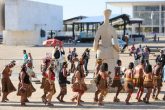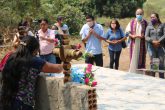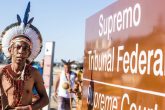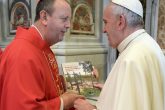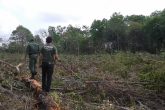Report No. 929: Guarani community surrounded by gunmen
Group is without access to water, basic health services and education
The indigenous Kaiowá Guarani community of Y’poí, located in the Paranhos (MS), are requesting help from the nation’s authorities. The group is surrounded by gunmen hired by landowners in the region. The community has retaken its traditional land on August 17, during the 2010 Free Land Camp (Acampamento Terra Livre), held this year in the capital of the state of Mato Grosso do Sul, Campo Grande. Since that day in August the group has been living on a virtual island surrounded by several small settlements, where the gunmen are now living. These are armed and often make threats to the community. They impede entry and exit from the region, which has cut off access of the indigenous to basic health services and education.
Since that day in August the group has been living on a virtual island surrounded by several small settlements, where the gunmen are now living. These are armed and often make threats to the community. They impede entry and exit from the region, which has cut off access of the indigenous to basic health services and education.
Photo: Guarani Kaiowá leaders during a general assembly, Aty guassu
The Guarani call for help because their children are getting sick and not even the National Foundation for indigenous Health (FUNASA) can reach the community to provide care. The Foundation argues lack of security. Meanwhile the group is even denied access to water.
Several complaints have been made to the federal prosecutor in Ponta Porã, the Federal Agency for Indigenous Affairs (Funai) and organs of state security. So far no action was taken to change the inhumane conditions in which they live.
n the state of Mato Grosso do Sul thousands of indigenous live confined to small portions of land, or in tarp tent camps abandoned on the edge of roads, discriminated and left to their fate.
In search of Rolindo Vera
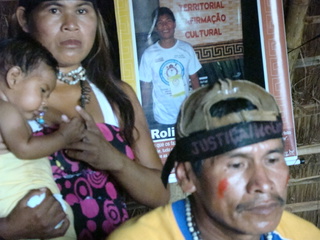 The retaking of traditional land occurred when the group found itself tired of waiting for a response from the Brazilian government regarding the identification of its territory. They are also impatient with the lack of investigations of what has happened to Professor Rolindo Vera, who has been missing for more than 300 days now.
The retaking of traditional land occurred when the group found itself tired of waiting for a response from the Brazilian government regarding the identification of its territory. They are also impatient with the lack of investigations of what has happened to Professor Rolindo Vera, who has been missing for more than 300 days now.
Photo: Father, wife and son of the missing Rolindo Vera; in the back the poster of Rolindo, demanding justice; Cimi Archive
Rolindo was kidnapped along with his cousin, Genilvado Vera, when masked gunmen evitced the community of the same area on October the 29th, after they had retaken the same area. Days later the body of Genivaldo was found in theY’poí creek. The family of Rolindo today still waits for the authorities in the state to report on the whereabouts of Rolindo or even if his body has been found.
"It is inadmissible that the Justice authorities remain silent in the face of such injustice. It is not possible for the government to be omissive in the face of this genocidal action against an indigenous community seeking to find the body of Professor Rolindo. It is an affront to the Constitution and international law to deny ground to a traditional indigenous community and, more importantly, to prevent access to the very government agencies entrusted with the protection and health care of indigenous people” , said Egon Heck, coordinator of the Indigenous Missionary Council (CIMI)Regional team in Mato Grosso do Sul.
1st Camp of Traditional Peoples and Communities in Paraná
Goal of the event is to give visibility to this segment of society as well demand the creation of a state law that guarantees their rights.
The 1st Camp of Traditional Peoples and Communities of Parana closed on August 2. The meeting, with the theme "This fatherland is also ours”, had as objective to give visibility to people and communities in the region, and to discuss the creation of a state policy that guarantees their rights. The event takes place at the Plaza of Our Lady of Sallete, in front of the Palace of Araucária, in Curitiba.
The theme of the mobilization alludes to the current situation in which these people live, being driven off their land, having their basic rights not guaranteed and gradually losing their cultural identities.
For indigenous leader Kreta Kaingang, coordinator of the Articulation of Indigenous Peoples of the South (Arpinsul), the Camp is a way to claim recognition of the peoples and traditional communities. "These peoples are invisible in the eyes of the government and therefore without a public policy to serve them. Our goal here is to show that we exist and just talk about our necessities”.
"We can not arrive as the 5th largest global power, according to government estimates, if the basic rights of traditional peoples are not respected", he said. He added that the creation of a state policy will bring the recognition and preservation of the way of life of these communities, their cultures and traditional knowledge.
In the South, especially the states of Paraná and Santa Catarina, this social invisibility is one of the major characteristics of traditional communities. Until recently, the absence of official statistics and census made these groups prepare their preliminary surveys in an attempt to affirm their collective existence in the midst of tensions, disputes and pressures that threaten their ethnic and collective rights guaranteed by the Constitution and several other legal structures.
Activities
On the first day of the camp, there was a general meeting between the participants of the meeting, with the participation of representatives of the State Secretariat of Education of Paraná (Seed). During the day, they shared their realities and discussed claims that will be presented to the candidates that run for governor, all of whom were invited to participate.
On Sept 2 the mobilization continued with a general debate, speeches by the various representatives and a rally through the center of Curitiba. In the afternoon, there was a hearing with representatives of the state government. At this time the policy proposals were delivered that had been elaborated by the 11 traditional participating communities.
Representation
Participating in the meeting were approximately 500 representatives of the indigenous Kaingang, Guarani and Xetá peoples and of the Quilombola communities (descendants of runaway slaves communities), Faxinalenses (peasants who collectively occupy the land and have common nurseries and herds), representatives of the inhabitants of the Rio Paraná island, traditional fishermen and women, cipozeiros (communities that live of products made of cipó twigs: lianas) and tradtional healing practioners.
The camp was organized by the Puxirão Network of Peoples and Traditional Communities, an organization that brings together the approximately 200,000 people belonging to the traditional peoples and communities of the state.
In Mato Grosso do Sul, Guarani community lives surrounded by gunmen
Group is without access to water and basic health services and education
The indigenous Kaiowá Guarani community of Y’poí, located in the Paranhos (MS), are requesting help from the nation’s authorities. The group is surrounded by gunmen hired by landowners in the region. The traditional land of the people was retaken on August 17, during the 2010 Free Land Camp (Acampamento Terra Livre), held this year in the state of Mato Grosso do Sul.
Since that day in August the group has been living in a virtual island surrounded by several small settlements, where the gunmen are now living. They are armed and often make threats to the community. Entry and exit from the region is being prohibited, which has prevented access of indigenous peoples to basic health services and education.
The Guarani request help because their children are getting sick and not even the National Health Foundation (FUNASA) can reach the community to provide care. The Foundation argues lack of security, and meanwhile the group is, even denied access to water.
Several complaints have been made to the federal prosecutor in Ponta Pora, the Funai and organs of state security. So far no action was taken to change the inhumane conditions in which they live thousands of indigenous MS, confined to small portions of land, abandoned on the edge of roads, broken and dropped to their fate.
In search of Rolindo Vera
The retaking of traditional land occurred when the group found itself tired of waiting for a response from the Brazilian government regarding the identification of its territory, stipulated by the Term of Adjustment of Conduct (TAC) signed by the National Foundation for Indigenous Affairs (FUNAI) and federal prosecutors. They are also impatient with the delay in reporting what has happened to Professor Rolindo Vera, missing for more than 300 days.
Rolindo was kidnapped along with his cousin, Genilvado Vera at this same site when the community had retaken the area. Days later the body of Genivaldo was found in theY’poí creek. The family of Rolindo today still waits for public safety authorities in the state to report on the whereabouts of Rolindo or even if his body has been found.
"It is inadmissible that the Court remain silent in the face of such injustice. It is not possible for the government to be omissive in the face of this genocidal action against an indigenous community seeking to find the body of Professor Rolindo. It is an affront to the Constitution and international law to deny ground to a traditional indigenous community and, more importantly, to prevent access to the very government agencies entrusted with the protection and health care of indigenous people” , said Egon Heck, coordinator of the Indigenous Missionary Council (CIMI)Regional team in Mato Grosso do Sul.
1st Camp of Traditional Peoples and Communities in Paraná
The event has as objective to give visibility to this segment of society as well as asking for the creation of a state law that guarantees their rights.
The 1st Camp of Traditional Peoples and Communities of Parana closed on August 2. The meeting, whose theme is "This homeland is also ours” , has as objective to give visibility to people and communities in the region, and to discuss the creation of a state policy that guarantees their rights. The event takes place at the Plaza of Our Lady of Sallete, in front of the Palace of Araucária, in Curitiba.
The theme of the mobilization alludes to the current situation in which these people live, being driven off their land, having their basic rights not being guaranteed and gradually losing their cultural identities.
For indigenous leader Kreta Kaingang, coordinator of the Articulation of Indigenous Peoples of the South (Arpinsul), the Camp is a way to claim recognition of the peoples and traditional communities. "These peoples are invisible in the eyes of the government and therefore without a public policy to serve them. Our goal here is to show that we exist and just talk about our necessities”.
"We can not arrive as the 5th largest global power, according to government estimates, if the basic rights of traditional peoples are not respected", he said. He added that the creation of a state policy will bring the recognition and preservation of the way of life of these communities, their cultures and traditional knowledge.
In the South, especially the states of Paraná and Santa Catarina, this social invisibility is one of the major characteristics of traditional communities. Until recently, the absence of official statistics and census made these groups prepare their preliminary surveys in an attempt to affirm their collective existence in the midst of tensions, disputes and pressures that threaten their ethnic and collective rights guaranteed by the Constitution and several other legal structures.
Activities
On the first day of the camp, there was a general meeting between the participants of the meeting, with the participation of representatives of the State Secretariat of Education of Paraná (Seed). During the day, they shared their realities and discussed claims that will be presented to the candidates for governor, all of whom were invited to participate.
On Sept 2 the mobilization continued with a large concentration of the group, speeches by the various representatives and a walk through the center of Curitiba. In the afternoon, there was an audience with representatives of state government. At this time the proposals were delivered that would integrate the state policy, developed earlier by the 11 traditional communities that participate in the event.
Representation
Participating in the meeting were approximately 500 representatives of the indigenous Kaingang, Guarani and Xetá peoples and the Quilombola communities of Terreiro (Umbanda and Candomblé), Faxinalenses (peasants who collectively occupy the land and have common nurseries and herds), Ilhéus do Rio Paraná, both men and women Fisherfolk and Cipozeiras, and healing practioners.
The camp was conducted by the Puxirão Network of Peoples and Traditional Communities, an organization that brings together the approximately 200,000 people belonging to the traditional peoples and communities of the state.


